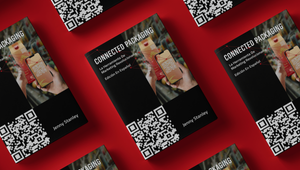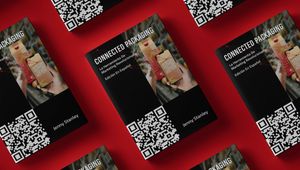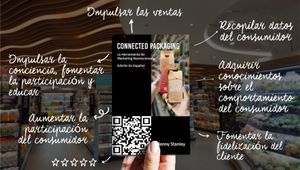
5 Minutes with… Jenny Stanley

Jenny Stanley has over 20 years experience in international sales management across the media, advertising and creative technology industries. Founder of multi award-winning digital experiences studio Appetite Creative, her mission is to lead creative technology in digital advertising.
Prior to launching in 2015, Jenny began her career at Microsoft as a senior member of the sales team, before moving to UTarget and Oddcast where she led business development. Later in her career, she was sales director at EyeWonder/Mediamind, and European commercial director at Adform.
An innovative and dynamic leader, in 2017 Jenny also founded the women's networking group FemmeNiche, bringing together, supporting and inspiring women from all backgrounds and industries. She is also an experienced judge for numerous leading industry awards, and is a respected authority on creative digital, brand solutions, advertising technology and effectiveness.
LBB’s Zoe Antonov spoke to Jenny about the most exciting developments in the digital advertising landscape, Appetite Creative expanding beyond her expectations, and the ways in which packaging and technology connect to create unique challenges and opportunities for customer connection.
LBB> Tell me about the start of your career and how you got your foot in the door. Is this something you always knew you'd be doing?
Jenny> I started my career at Microsoft as a senior member of the sales team. I’ve always been mesmerised by IT, and my dad was always interested in the latest technology and innovations, so my passion organically grew from there. Advertising-based technology and creativity is my happy place – it’s the perfect combination of technology, evolution and creatively finding solutions for brands.
After Microsoft, I moved to UTarget and Oddcast (leading business development). Latterly, I was sales director at EyeWonder/Mediamind and European commercial director at Adform. I founded Appetite Creative in 2015 with the mission to lead creative technology in digital advertising.
LBB> What were the biggest lessons you took away from your first steps in the industry?
Jenny> There are wonderful women who want to help others succeed - find those, seek them out and they will be your comfort, advisors and strength in the really hard times. The biggest lesson I learned is to dig deep and keep going. It’s those who push through the barriers that reap the rewards.
I founded the women's networking group, FemmeNiche, in 2017 to help further this lesson and bring together brilliant women, as well as help to support and inspire women from all backgrounds and industries.
By pushing through barriers and finding support from my brilliant network, I’ve become a respected authority on creative digital, brand solutions, advertising technology and effectiveness.
LBB> How did you decide to found Appetite Creative and what was the process like?
Jenny> When I started my business, my back was really against the wall. I was in another country (Spain), with no family around, a language I couldn't speak well, was a single mother to a toddler, and a woman. The odds were stacked against me.
It was then that I realised I just had to keep going, and I found an inner strength that I hadn't really experienced before. Even when all of the cards seem stacked against you, if you believe in yourself, you can make great things happen. We, as women, are much stronger than the media will lead us to believe.
LBB> From its first days up until today, how has Appetite Creative changed, and what kind of pillars carried and still carry the company?
Jenny> Appetite Creative was originally an advertising banner company, and it has evolved far beyond my initial expectations. Back then, we could see advertising was the king of creativity in the digital space - especially with so much focus on programmatic - so we decided to specialise and become a digital experiences studio using creative technology and connecting brands to today’s audiences.
We want to help brands realise the potential of their most powerful marketing asset already found in the hands of their customers, by turning product packaging into a media channel.
We use innovative technology to deliver connected brand experiences which help advertisers to better understand audiences through first party data, optimised marketing, driven sales, and improved two-way customer communications. From digitising direct mail to creating fun games accessed on mobile through packaging, we work with a variety of recognisable brands including Bacardi, Tetra Pak, Greiner Packaging, Pepsi, Starbucks, Samsung, Vodafone, CocaCola, Emmi, Don Simon, Merck and Royal Mail.
Our team of digital marketing specialists have a passion for bringing innovative advertising to life, delivering bespoke campaigns and advertising solutions across all devices and screens.
Recent campaigns include a spooky app-based game in time for Halloween with Halewood Artisanal Spirits unconventional spiced rum brand Dead Man’s Fingers, a new augmented reality connected experience for Emmi accessed via its smart packaging, and new ‘universal’ connected experience for Tetra Pak which is a first for the packaging industry.
LBB> What does it mean, in your view, to lead creative technology in digital advertising and what are some recent developments in the sphere that get you excited?
Jenny> I love working at the forefront of technology. It’s fast-paced, exciting and constantly evolving. It’s a challenge to keep up with the endless updates and new tech, but for me at least, that keeps my day job fun and interesting. I would die selling the same tech for years!
In terms of developments, I recently presented at Paris Packaging Week and I shared numerous examples of the benefits and value our clients are seeing by adopting connected experiences. It gives them an opportunity to transform packaging into a media channel and connect directly with consumers through digital experiences including games, loyalty programs, authentication, quizzes, vouchers and much more.
One example I shared was our work with Elopak’s new aluminium-free carton which Don Simon has just started using for its beverages. We were able to raise awareness of the new aluminium-free carton, personalise the experience by product type, test customer knowledge, address the gaps and drive sales. All while identifying ambassadors for the brand. We saw an average dwell time of two minutes and 46 seconds, 14% scan rate and 60% registration.
The key trends I saw at the conference reflected the growing importance of sustainability, personalisation and smart packaging across the industry. Both brands and packaging producers are working to reduce their environmental impact, improve the customer experience, and streamline operations via innovative technologies and materials.
Connected or smart packaging is continuous and low-cost media advertising alternative to TV, out of home and product placement. It encourages customers to directly interact with your brand for minutes rather than seconds. With changes in legislation, large brands such as Coca-Cola and AB InBev adopting an ‘always on approach’ and secure QR codes readily available for authentication purposes, now really is the time to go digital, smart and sustainable across all packaging. It’s not only impactful, but also cost effective. The average cost per digital advertising click is £1.50, whereas a ‘click’ or scan on packaging is technically ‘free’, giving brands a compelling reason to use connected packaging.
LBB> Tell me about the benefits of collection of first-party data analytics and how they can advance brands with connected packaging?
Jenny> It is of course a major advantage for any brand, with connected packaging delivering this valuable information directly from the customer’s fingertips. Simply by scanning QR codes or barcodes on the product packaging, customers are led to a customised digital campaign. This could be a quiz exploring customer product preferences, education campaigns about health or the environment, to a game that offers discounts, vouchers or sampling. Whatever the structure, it allows for GDPR compliant data collection, and the consumer journey is simple, with no extra app installations required.
LBB> And how do these approaches go in line with sustainability asks?
Jenny> A brand’s wider contribution to, or impact on society is a growing consideration for consumers, with sustainability one of the key topics under scrutiny. We’re seeing a growing demand for sustainable technology solutions. Brands are increasingly looking to combine environmentally-friendly business practices with consumer education and engagement. At Appetite Creative, we’ve worked on a number of web-based recycling education programmes. Specifically, we’ve been helping marketers deliver important information in a way that is easy to digest and action, empowering them to make the right choices for themselves and the planet.
LBB> How can connected packaging benefit from the recent developments in the augmented reality sector?
LBB> AR offers user experience enhancements to the physical world around them. The user can interact with digital technology that responds to their actions, superimposing audio, video and graphics onto the world as they see it. This technology transforms every day, including things we take for granted, like product packaging.
Packaging can drive increased product consumption aided by AR. For example, a makeup brand might offer virtual try on or access to tutorial content through a packaging code. This encourages overall consumption of the brand’s make-up range.
LBB> Tell me about FemmeNiche and its activities as well as how the founding of it enriched your own development.
Jenny> When I originally started Appetite Creative, I found it really hard to network. They were always rooms full of men, and events - especially in Dubai - were more tailored to picking up women than work-related. I wanted to create a safe space for women to meet, share stories and inspire others.
Through FemmeNiche, I’ve met some amazing people - speakers who have climbed the seven peaks or cheated death more than once, and so many different perspectives and cultures which are so different to mine and gave me some real perspective.
It’s not about women over men, it’s not women ‘bitching’ about men or other women, but women coming together and inspiring each other. Learning from each other, leaning on each other, getting a different perspective, an extra boost, either to go for a promotion, achieve a pay rise or, just to be the best that they can be.
Femme Niche is a place to meet new people, learn new perspectives, understand others and yourself better. Gain a new level of confidence and have fun doing it.
LBB> What does your day to day look like and what are your favourite parts of your current role? What about its biggest challenges?
Jenny> I have a team of 20 people at the moment, so a lot of my time involves liaising with them on our current projects and supporting them in their daily work life. I also work closely with our clients, from Tetra Pak and Greiner Packaging to large food and drinks producers. We work with a variety of brands who all have different requirements and demands that we collaborate on and manage closely. I like to stay in touch regularly to build positive working relationships.
New business is always a big part of any business, from regularly networking, attending or presenting at a conference and supporting our marketing and PR activity, to meeting potential new clients or preparing new business pitches. Selling is a big part of my role as managing director and founder!
LBB> In the vein of digital advertising, would you be able to give us a comment on the recent developments around AI software and your opinion on how these will affect the industry?
Jenny> AI software has already had a significant impact on the digital advertising industry and is likely to continue to do so in the future. A few ways that AI is already impacting the industry include:
Improved targeting: AI-powered algorithms can analyse vast amounts of data to identify patterns and insights that can be used to target ads more effectively. This can lead to more efficient ad spending and better results for advertisers.
Personalisation: AI can be used to personalise ad content and messaging based on user data and preferences. This can improve the relevance of ads and increase engagement.
Automation: AI-powered tools can automate many aspects of ad creation and management, such as A/B testing, bid management, and performance tracking. This can save time and improve efficiency for advertisers.
Voice search: As voice search becomes more popular, AI-powered voice assistants like Siri and Alexa are increasingly being used to deliver ads to consumers. Advertisers will need to adapt their strategies to optimise for voice search and take advantage of this emerging channel.
I believe that AI will continue to have a significant impact on the digital advertising industry, enabling more precise targeting, greater personalisation, and increased automation. It will be important to balance the benefits of AI with potential concerns around data privacy and ethics.
LBB> And finally, what are your passions and hobbies outside of work?
Jenny> Horses! I love horse jumping and dressage – especially being with my horses as my daughter and I compete together.















